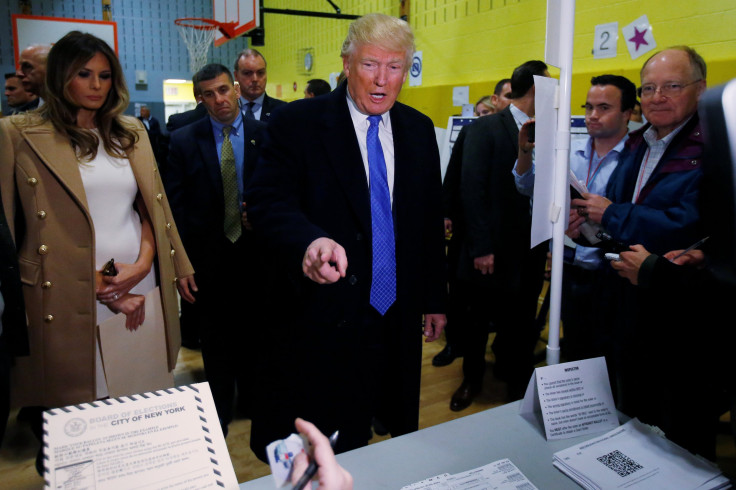Final Presidential Polls: Where Hillary Clinton, Donald Trump, Gary Johnson, Jill Stein Stand On Election Day

As voters around the country flock to polling sites on Election Day, the final presidential polls released Tuesday hinted at a slim popular-vote victory for Republican Donald Trump over Democrat Hillary Clinton in both a two-way race or a four-way contest that included Libertarian Gary Johnson and Green Party candidate Jill Stein.
In the days and weeks leading up to the election, Clinton, hoping to become the first woman ever elected to the White House, was given as much as a 7-point edge over Trump, according to a Real Clear Politics compilation on Monday. A handful of those polls included one showing a 7-point swing and victory in Trump’s direction, but the overwhelming majority were in Clinton’s favor.
Yet, three polls released Tuesday by Investor’s Business Daily (IBD) and TechnoMetrica Market Intelligence (TIPP) Tracking and the joint effort the Los Angeles Times and the University of Southern California reflected a narrow race with Trump claiming victory by 2 points in one poll. In a two-way race, the L.A. Times/USC tracking poll put Trump ahead by three points, 47-44. One of IBD/TIPP’s polls positioned Clinton ahead by a single point, 43-42.
But when IBD/TIPP expanded the poll to include dark-horse candidates Johnson and Stein, Trump garnered a 2-point advantage (Trump 45, Clinton, 43, Johnson 8, Stein 2).
It's important to note that both the L.A. Times/USC poll and the IBD/TIPP poll are not highly cited polls. Furthermore, the poll results represent a stark contrast from most other trusted polls on Monday.
An ABC News/Washington Post poll showed a 4-point Clinton lead even with Johnson and Stein in the running while CBS News’ final poll came up with the same results. A Monmouth University poll had Clinton at 50 percent, 6 points better than Trump at 44, with Johnson at 4 percent and Stein at 1 percent.
There are other potential factors in play, like reported voter intimidation, long and frustrating lines, and voting-machine breakdowns potentially influencing the election's final outcome and opening the door for a previously unlikely Trump win.
The polls also suggest that the possible siphoning of votes from Clinton by Johnson and Stein’s candidacy may have been correct, though neither candidate has truly made much of a dent on the national stage.
It's been a particularly frustrating few weeks for Johnson. The former New Mexico governor climbed as high as 13 percent in September in a Quinnipiac poll, but failed to reach double digits in October or November, dipping to as low as 3 percent.
Stein’s pinnacle of nearly 7 points came in late June, and like Johnson, her poll numbers dropped as the election grew closer. The Harvard-educated physician, running on a platform to take money out of politics and to do away with student debt, has trended to the 2 to 3 percent range over the last six weeks, last touching 4 points in an NBC News/SurveyMonkey poll on Oct. 18.
© Copyright IBTimes 2024. All rights reserved.




















